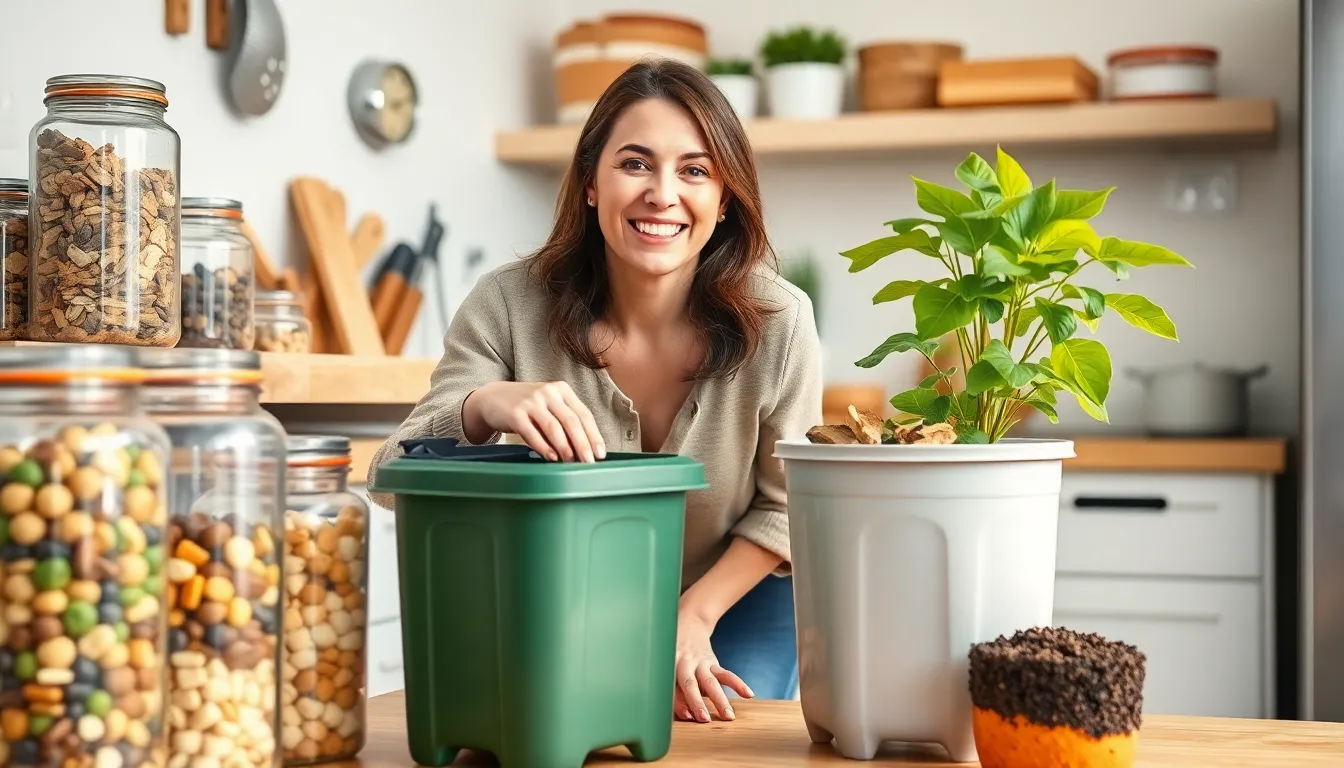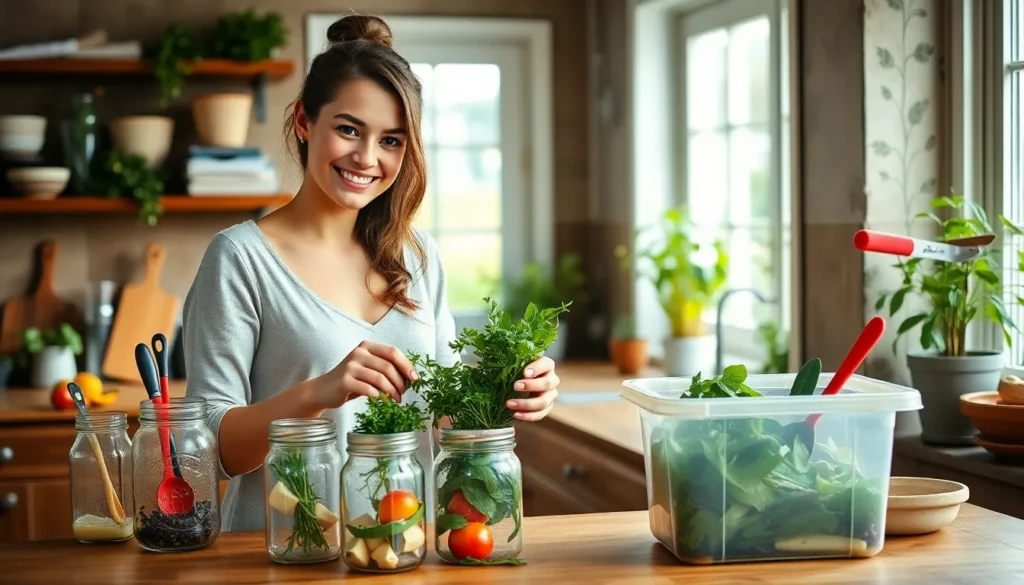In today’s eco-conscious world, finding innovative ways to recycle in the kitchen has never been more important. With a little creativity, everyday items can be transformed into functional tools or beautiful decor, reducing waste and promoting sustainability.
From repurposing glass jars for storage to turning old utensils into unique art pieces, there are countless kitchen recycling ideas that not only help the environment but also add a personal touch to any home. Embracing these practices not only declutters the kitchen but also inspires a more mindful approach to living.
Table of Contents
ToggleUnderstanding Kitchen Recycling Ideas
Kitchen recycling ideas provide practical solutions for reducing waste and integrating sustainability into daily routines. Creative approaches encompass various items commonly found in kitchens, promoting resourcefulness.
Glass Jars
Glass jars serve multiple purposes beyond their original function. They can store dry ingredients, such as pasta or grains, and act as containers for homemade sauces or dressings. Repurposing glass jars can also enhance organization in the pantry.
Old Utensils
Old utensils can transform into artistic décor or functional tools. Forks can bend into hooks, while wooden spoons can become unique coasters. Creativity enhances kitchen aesthetics and reduces clutter.
Food Scraps
Food scraps offer opportunities for composting. Vegetable peels, coffee grounds, and eggshells can enrich compost piles. Additionally, some scraps, like green onion roots, can regrow when placed in water.
Cardboard Boxes
Cardboard boxes, often used for packaging, can serve various storage needs. They can organize pantry items or provide craft supplies for kids. Upcycling cardboard contributes to waste reduction and functionality.
Plastic Containers
Plastic containers from takeout or groceries can be reused for food storage or organizing small items. They can also function as planters for small herbs, linking gardening to kitchen recycling.
Old Towels
Old towels can become dish rags or cleaning cloths. Repurposing fabric reduces the need for disposable paper towels, contributing to a more sustainable kitchen.
Implementing these kitchen recycling ideas leads to reduced waste and promotes a mindful approach to resource management, directly aligning with sustainability goals.
Benefits of Kitchen Recycling

Kitchen recycling offers substantial advantages, particularly in sustainability and economics. This practice not only minimizes waste but also fosters a more responsible lifestyle.
Environmental Impact
Recycling in the kitchen significantly contributes to environmental protection. It reduces the volume of waste sent to landfills, which decreases greenhouse gas emissions produced by decomposing organic materials. Composting kitchen scraps enriches soil, promoting healthier plant growth while minimizing the need for chemical fertilizers. Additionally, repurposing materials like glass and plastic conserves resources and energy required for new product manufacturing. Studies show that recycling one ton of paper can save 17 trees and 7,000 gallons of water. Such practices lead to enhanced biodiversity and healthier ecosystems.
Cost Savings
Implementing recycling methods in the kitchen results in noticeable cost savings. By reusing materials, such as glass jars for storage or plastic containers for organization, individuals cut down on purchasing new items. Composting food scraps reduces grocery bills, as it allows for the creation of nutrient-rich soil amendments for home gardens. A study indicates that households engaging in composting can save over $100 annually on gardening inputs. Furthermore, transforming old utensils into functional tools or decor eliminates costs associated with buying new kitchen gadgets, making recycling economically advantageous.
Creative Kitchen Recycling Ideas
Innovative kitchen recycling ideas enhance sustainability by transforming common items into functional resources. These creative solutions reduce waste while promoting an eco-friendly lifestyle.
Upcycling Kitchen Containers
- Use glass jars for storage: Glass jars serve as perfect containers for dried herbs, spices, and pantry staples. They keep food fresh and organized, and their transparency allows for easy identification of contents.
- Transform plastic containers: Plastic containers can be repurposed as organizers for small kitchen tools, utensils, or office supplies. They’re sturdy and reusable, helping to maintain a tidy environment.
- Create planters from unused containers: Old teacups, mugs, or small pots can become charming planters for herbs or succulents. They add a decorative touch to the kitchen while supporting indoor gardening.
Repurposing Scraps for Gardening
- Utilize vegetable peels: Vegetable peels can enrich compost or be used as organic mulch. They add nutrients to the soil, promoting healthy plant growth.
- Turn citrus scraps into pest deterrents: Citrus rinds can repel pests when scattered in garden beds. Their natural oils deter unwanted insects, keeping gardens healthier without chemical treatments.
- Reuse eggshells for nutrients: Crushed eggshells can serve as a natural fertilizer, supplying calcium to plants. They help improve soil structure and assist in preventing blossom end rot in tomatoes.
DIY Composting Solutions
- Set up a compost bin with kitchen scraps: A simple compost bin can be created using kitchen leftovers like fruit and vegetable scraps, coffee grounds, and eggshells. This bin reduces waste while producing nutrient-rich compost.
- Use bokashi method for fermentation: The bokashi method involves fermenting kitchen scraps in a sealed container with bokashi bran, reducing odors and allowing food waste to decompose quickly. This method often produces compost faster.
- Implement a worm composting system: A worm bin, or vermicomposting system, effectively breaks down organic waste using red worms. Worm castings yield high-quality fertilizer, enriching garden soil.
These creative kitchen recycling ideas maximize resources, minimize waste, and support a sustainable lifestyle.
Practical Tips for Implementing Recycling
Implementing effective recycling practices in the kitchen requires organization and a commitment to sustainability. The following tips provide practical strategies for improving kitchen recycling efforts.
Organizing Your Kitchen
- Create designated recycling bins for paper, plastic, and glass items to streamline sorting.
- Label bins clearly with recycling guidelines to ensure proper disposal.
- Utilize countertop containers for food scraps, making composting convenient.
- Store reusable bags near the entrance to prompt their use when shopping.
- Use stackable bins for a compact organizational solution, maximizing space efficiency.
Developing Sustainable Habits
- Integrate batch cooking into your routine to minimize food waste.
- Choose bulk buying options to reduce packaging waste and save money.
- Implement a meal planning strategy to use ingredients effectively, reducing leftovers.
- Encourage family involvement in recycling and composting activities to foster a collective effort.
- Commit to regular evaluations of kitchen waste, identifying areas for improvement.
Embracing kitchen recycling ideas can transform not only the space but also one’s lifestyle. By creatively repurposing items and reducing waste, individuals contribute to a healthier planet while enjoying the benefits of organization and cost savings. The journey towards sustainability begins with small, mindful choices in the kitchen.
Implementing these practices fosters a sense of responsibility and community, encouraging others to join the movement. As more people adopt these innovative recycling methods, the collective impact on the environment becomes increasingly significant. Every effort counts in building a more sustainable future, making each step taken in the kitchen a meaningful contribution to the planet’s well-being.





